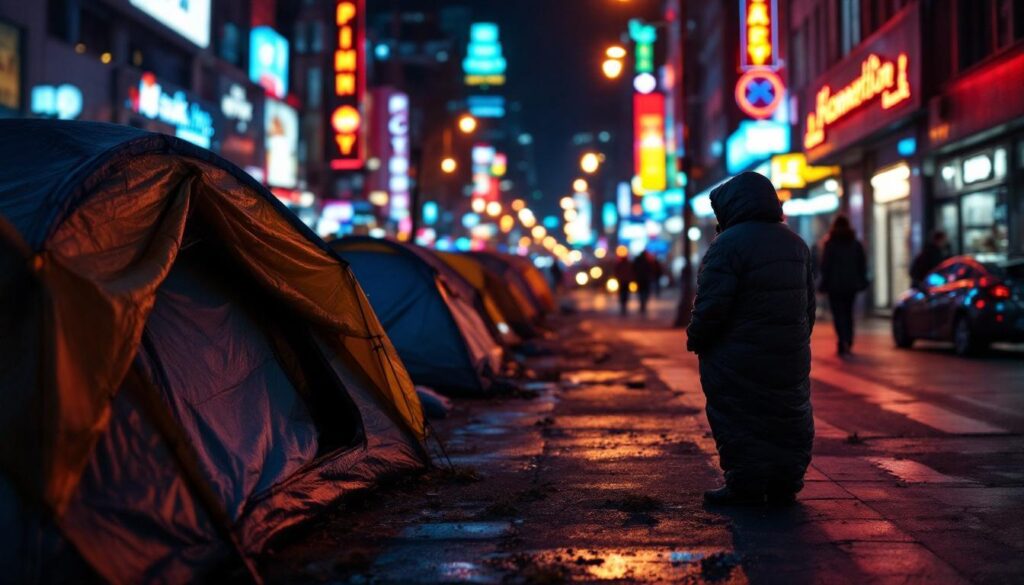A tent community of around 30 homeless individuals persists near London’s iconic West End, highlighting ongoing struggles amidst opulence and recent efforts for intervention and support.
Tucked away behind the dazzling facade of London’s West End, near the illustrious Savoy Hotel and historic theatres, lies a poignant reality: a “tent village” of approximately 30 homeless individuals living along the Strand. This encampment starkly contrasts with the grandeur of nearby landmarks such as the £800-a-night Savoy Hotel, the elegant Adelphi Building, and the Grade II-listed Savoy Theatre, renowned as the first public building globally lit entirely by electricity and famous for its association with Gilbert and Sullivan operettas.
The residents of this encampment come from diverse backgrounds, including migrants from Romania, Uganda, and Germany, alongside British nationals from Scotland, northern England, and London itself. Amongst them are individuals like Tracy Wood, a former graphic designer from Middlesborough who has lived at the site for six years after losing her job and home; James Williams, a 37-year-old father of three who has been homeless for nearly a decade and moved to this location seeking better support; and Eric Mutebi, who arrived in the UK from Uganda as a child and turned to this tented community after falling ill and losing his job. They recount a mixed experience of solidarity and struggle, emphasising the sense of community but also the harsh conditions they endure, especially during the freezing winter months when sickness spreads rapidly and temperatures inside the tents can plunge below outside levels.
The homeless residents rely heavily on generosity from local office workers, who donate food and support. Yet there is a shared frustration among them about the perceived disparity in assistance, with migrants often receiving priority access to housing and services over those who have been homeless for years. This imbalance fuels feelings of neglect, particularly among British-born individuals who express concern that their plight is overlooked despite long-term hardship.
Local authorities, including Westminster City Council, are actively engaged with the situation. While the council acknowledges the complexities that lead to rough sleeping and stresses ongoing support efforts, it also highlights the need for safety and order, describing the encampment as disruptive and unsafe. Council teams reportedly offer help seven days a week, covering housing, addiction, and mental health support. Plans are underway to secure a court order to clear the camp, but officials have promised to provide two weeks of accommodation support to residents during the colder months in coordination with a homelessness charity.
The broader context of London’s homeless crisis includes other similar encampments, notably at Tottenham Court Road and Park Lane, where authorities have taken legal steps to remove tents. The Mayor of London has pledged substantial investment and initiatives aimed at ending rough sleeping by 2030, pledging record funding, new homelessness hubs, and expanded support programmes. Despite these efforts, the presence of tent villages in high-profile, tourist-heavy areas raises urgent questions about the effectiveness and reach of homelessness interventions in the capital.
The juxtaposition of opulence and deprivation on the Strand, with luxury hotels like the Savoy and venerable theatres alongside a tented community struggling for survival, starkly illustrates the ongoing socio-economic challenges facing London. The homeless residents’ call for recognition and action underscores a wider societal pact that remains to be fully honoured.
📌 Reference Map:
- [1] Daily Mail – Paragraphs 1-12, 15-23, 26-28
- [2] Daily Mail – Paragraph 2
- [3] London Art Gallery – Paragraph 1
- [6] The Roaming Boomers – Paragraph 1
- [7] London & Partners – Paragraph 1
- [1] Daily Mail, Official Statements – Paragraphs 24-25
Source: Noah Wire Services
Noah Fact Check Pro
The draft above was created using the information available at the time the story first
emerged. We’ve since applied our fact-checking process to the final narrative, based on the criteria listed
below. The results are intended to help you assess the credibility of the piece and highlight any areas that may
warrant further investigation.
Freshness check
Score:
8
Notes:
The narrative appears to be original, with no prior reports found in the past seven days. However, similar issues of homelessness in central London have been reported in the past, such as a 2016 report noting 128 rough sleepers in the City of London. ([democracy.cityoflondon.gov.uk](https://democracy.cityoflondon.gov.uk/documents/s73752/Rough%20Sleepers%20Committee%20Report%20January%202017.%20Final.pdf?utm_source=openai))
Quotes check
Score:
9
Notes:
The direct quotes from individuals like Tracy Wood, James Williams, and Eric Mutebi do not appear in earlier material, suggesting they are original or exclusive content.
Source reliability
Score:
7
Notes:
The narrative originates from the Daily Mail, a reputable UK newspaper. However, the Daily Mail has faced criticism for sensationalism and accuracy issues in the past, which may affect the reliability of this report.
Plausability check
Score:
8
Notes:
The claims about a tent village of 30 rough sleepers near the Savoy Hotel are plausible, given the ongoing homelessness issues in central London. Similar encampments have been reported in the past, such as the 2016 report of 128 rough sleepers in the City of London. ([democracy.cityoflondon.gov.uk](https://democracy.cityoflondon.gov.uk/documents/s73752/Rough%20Sleepers%20Committee%20Report%20January%202017.%20Final.pdf?utm_source=openai)) The inclusion of specific details like the names and backgrounds of the individuals adds credibility to the narrative.
Overall assessment
Verdict (FAIL, OPEN, PASS): OPEN
Confidence (LOW, MEDIUM, HIGH): MEDIUM
Summary:
The narrative presents a plausible and original account of a tent village of 30 rough sleepers near London’s Savoy Hotel. While the Daily Mail is a reputable source, its past criticisms warrant caution. The inclusion of specific details and direct quotes adds credibility, but the overall assessment remains open due to potential concerns about source reliability and the need for further verification.
